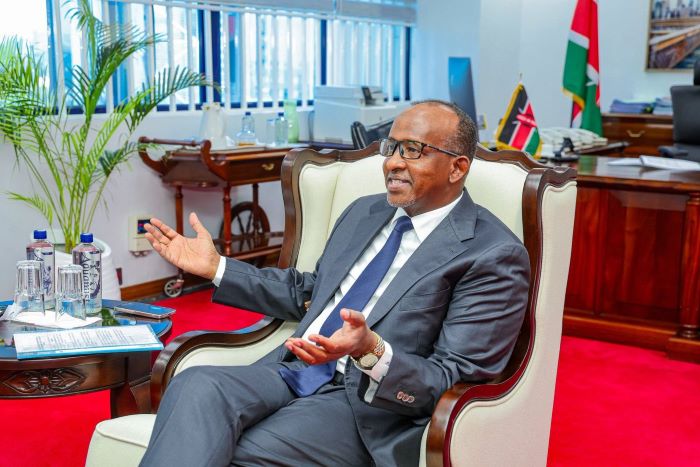Heath Cabinet Secretary (CS) Aden Duale has urged more Kenyans to enroll in the Universal Health Coverage (UHC) under the Social Health Authority (SHA).
Speaking at a fundraising event for Harhosa Mixed Day Secondary School in Marsabit County on Sunday, Duale noted that the new health care programme will allow all citizens to access affordable healthcare, unlike the defunct National Hospital Insurance Fund (NHIF), which benefited employed Kenyans.
He added that the enrolment has been slowed down by critics, who he says were making illegal financial gain with the defunct NHIF. “Those opposing SHA are fraudsters. We have discovered that there are some private hospitals which are saying they are in Moyale but when doctors are dispatched, they are no longer there. They are opposing it because they were receiving free money,” he said.
He urged residents in the North-Eastern region to embrace the healthcare programme to access quality healthcare.
“I have seen Marsabit, Garissa, Wajir, Mandera, Isiolo and Tana Rive still have low enrolment numbers. We will come with teams from SHA so that we register more people,” Duale noted.
This comes a week after Duale sounded the alarm over fraudulent claims by some health facilities to SHA, cautioning that institutions found culpable of billing for non-existent services will face blacklisting.
Appearing before the Senate Committee on Health, CS Duale revealed that investigations are already underway targeting doctors allegedly involved in fraudulent billing practices.
He also acknowledged operational hiccups within the system, faulting some health workers and institutions for their role in undermining the program.
“The system may be facing challenges,” said Duale, “but part of the problem lies with dishonest health practitioners who are making false claims.”
SHA, which was launched to streamline access to affordable healthcare, has faced significant challenges since its inception. Many Kenyans have voiced concerns over its implementation, and now, allegations of fraud are casting further doubt on the program’s integrity.
Leaders continue to urge Kenyans to register on SHA as the country continues to grapple with critical healthcare challenges, including staffing shortages, funding constraints, and increasing demand for quality services under the SHA framework.
Meanwhile, the Kenya Medical Practitioners, Pharmacists and Dentists Union (KMPDU) has thrown its full weight behind Duale’s directive to freeze the licensing of foreign doctors, citing a festering crisis of unethical practices and organ trafficking in the country.
In a fiery press statement released on Sunday, the union painted a grim picture of Kenya’s healthcare sector, alleging that the unchecked recruitment of over 1,600 foreign doctors — mainly in plush private hospitals — had opened the floodgates to exploitation, medical malpractice, and even the sinister trade of human organs.
“We fully support the directive by the Cabinet Secretary to halt the licensing of foreign doctors,” KMPDU Secretary General Dr. Davji Atellah declared.
“The lives of Kenyans cannot continue to be gambled with in a profit-driven circus that undermines both patient safety and the dignity of our local medical practitioners.”
The union did not mince words, accusing private hospitals of circumventing ethical hiring standards, exploiting migrant doctors with poor working conditions, and in turn, creating fertile ground for dangerous medical malpractices. In a stunning revelation, KMPDU linked the shadowy recruitment of foreign doctors directly to confirmed cases of illegal organ trafficking, warning that the very sanctity of human life was now at stake.
With over 4,000 qualified Kenyan doctors languishing in unemployment — many, the union lamented, reduced to hawking wares and selling timber — KMPDU slammed the system as “an insult to the Kenyan taxpayer” and “a betrayal of the country’s investment in its own.”
Demanding swift action, KMPDU laid down a raft of requirements alongside their support for the CS’s directive: a full audit of recruitment practices, public disclosure of areas with genuine doctor shortages, a crackdown on exploitative labor conditions, and a transparent reallocation of vacated jobs to qualified Kenyan practitioners.
“The State must act swiftly to safeguard our lives and health. At this critical time, it cannot abdicate its solemn duty and responsibility of guaranteeing every Kenyan the highest attainable healthcare, as enshrined in Article 43 of our Constitution,” said Dr. Atellah.
The union also sounded the alarm over political interference and bribery at the Kenya Medical Practitioners and Dentists Council (KMPDC), warning that undue pressure to license unqualified individuals had turned healthcare into a perilous game of Russian roulette.
As the Health ministry’s freeze sets in, KMPDU vowed to keep a hawk’s eye on the process, pledging to champion a healthcare system “democratically owned, driven, and sustained by the people of Kenya,” echoing the spirit — and perhaps the desperation — of a nation fighting to reclaim the soul of its health system.
Email your news TIPS to Editor@Kahawatungu.com — this is our only official communication channel


